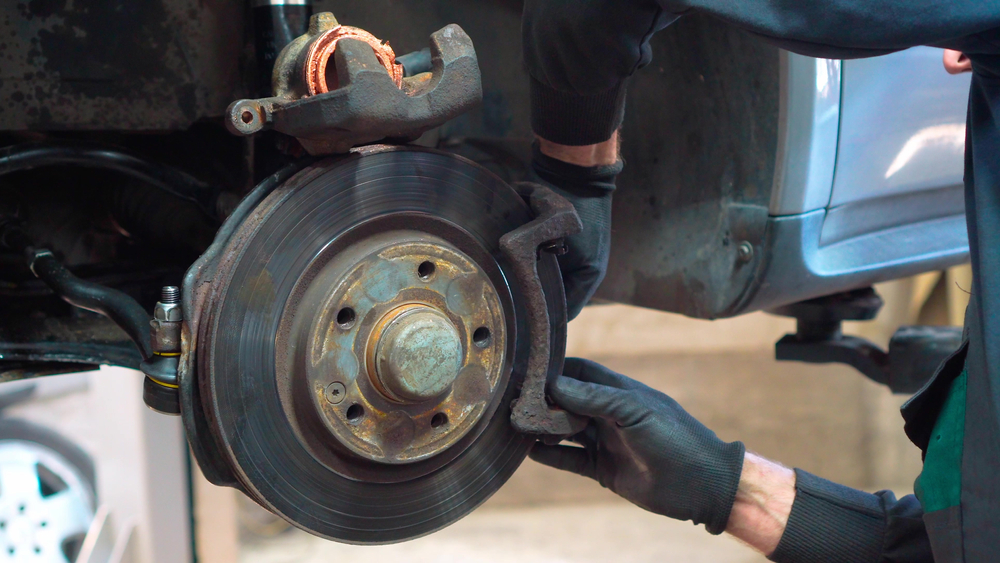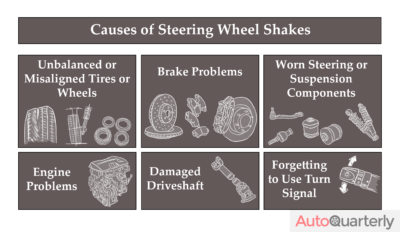A shaking steering wheel oftentimes may not seem like a serious issue, especially if it doesn’t immediately affect your ability to drive. However, steering wheel shakes can be a symptom of a number of different internal problems that could become more severe with time. If you find yourself experiencing steering wheel shakes while driving, it’s important to take the necessary actions to quickly get the problem fixed.
What to Do if Your Steering Wheel Is Shaking
First and foremost, if you feel your steering wheel shaking while you’re driving, get off the road and go straight to a mechanic. While a shaky steering wheel may not affect your immediate ability to drive too much, it can be indicative of much more serious problems with your vehicle that could potentially put your life and the lives of others in danger.
A shaking steering wheel can be a symptom of many different problems that may be going on with your vehicle, making it very difficult to diagnose. Unless you have years of training in car mechanics, it’s better to bring your vehicle to a professional and let them fix it. Even the best mechanics can have a difficult time finding the root cause of steering wheel shakes, so it’s definitely not a job that should be taken on by the average person.
A shaking steering wheel can be caused by problems with a wide range of car components. These are the most common cause of steering wheel shakes:
Causes of Steering Wheel Shakes
There are a few key causes of steering wheel shakes, and knowing about each of them will help you identify which one you are suffering from.
Unbalanced or Misaligned Tires or Wheels
One of the most common, and easiest fixes, for steering wheel shakes is having misaligned or unbalanced tires.
Tire Balance
One of the first things that you should do if you find that your steering wheel is shaking is check the wear on the tires. If you find uneven wear on the tread, this could be the result of unbalanced tires. If this is your problem, you will probably not notice steering wheel shakes at lower speeds. Shaking due to unbalanced tires starts at around 50 miles per hour.
Unbalanced tires are typically a pretty easy fix, but it’s still best to consult a mechanic to make sure that your problem is not something more serious. Unbalanced tires can cause you to wear out steering and suspension components, lower your fuel economy, or even cause a tire to blow out while driving.
The first thing to do in this situation is to check that all of your tires are properly inflated. If your tires are all at the proper pressure and the problem persists, you may have an issue with your wheel alignment.
Misaligned Wheels
Wheel alignment is intended to make sure that all of your wheels are pointing in the same direction. If your wheels are misaligned even slightly, it could be the cause of your shaking steering wheel.
If you notice uneven wear on your tire tread, particularly if the tires are more worn on the inside tread, you may have a problem with your wheel alignment. Another symptom of this problem is if you hold your steering wheel straight and the car still pulls in one direction or the other.
If you suspect that your wheels are misaligned, take your car to a mechanic immediately.
Worn or Damaged Bearings
Bearings are designed to attach the wheel hub to the vehicle’s suspension and to ensure that the vehicle can turn properly. If you experience steering wheel shakes only while turning, your problem could be worn or damaged bearings. Strange noises coming from your wheels while accelerating, unresponsive steering, or problems with your ABS sensor are also common signs of worn or damaged bearings.
A good way to determine whether or not your shaky steering wheel is due to a faulty bearing is to listen for a strange noise while turning quickly. If the noise gets louder while turning in one particular direction, your problem is most likely due to a faulty bearing on that side. Of course, when performing this test, it’s important to exercise extreme caution as driving on a faulty bearing can impair your steering ability.
Another way to check your vehicle’s bearings is to raise the vehicle and try rocking the tires. If there is a lot of movement, it probably means you need to have your bearings replaced.
Brake Problems
If your brakes have issues, it often manifests itself as steering wheel shakes. There are a few things that could be going on with your brakes.

Brake Rotor Problems
If your steering wheel is shaking a lot while braking, it could be caused by a problem with your brake rotors. Brake rotors are supposed to be perfectly round, but if they’ve started to wear out and lose their shape, it could be the reason your steering wheel is shaking while braking.
Resurfacing your brake rotors may solve the problem; however, if this doesn’t work, you will need to get entirely new brake rotors. Even if your brakes were recently installed, incorrect installation of your brake rotors can cause them to wear out and warp very quickly.
Brake Pad Problems
Brake pads are connected to the steering wheel through your vehicle’s knuckle arms. So, if you find that your brake rotors are in good shape but you’re still experiencing steering wheel shakes, your problem may be worn brake pads.
Front and rear brake pads wear at very different rates, so it’s important to get your brake pads replaced in pairs. You should replace both of your front brake pads at the same, both of your rear brake pads at the same time, or all four at once.
Brake Caliper Problems
Brake calipers bracket the brake pads on either side of the rotor and are essential for slowing down your vehicle. If you feel your steering wheel shaking when you brake, and you’ve figured out that it’s not a problem with your brake pads or brake rotors, there’s a good chance that the issue is with your brake calipers.
Brake caliper issues can be serious, and you may even start to notice a burning smell if your calipers are overly worn. As with all issues with your braking system, you should pull over immediately and seek help if you suspect there might be a problem with your brake calipers.
Worn Steering or Suspension Components
There are certain components to your steering and suspension that are particularly prone to suffering wear and tear.
Problems With Tie Rod Ends or Ball Joints
Another component that is important to the steering of your vehicle are the tie rod ends. If you find that your bearings are secure, but you’re still experiencing steering wheel shakes while turning, it may be a problem with your tie rod ends.
Faulty tie rod ends will pretty much only cause shakiness in your steering wheel while cornering, and never while driving straight.
Ball joints are the pivot between your vehicle’s wheels and its suspension. If you find that your steering wheel is only shaking while driving straight, and never while cornering, it’s likely that your problem is with your vehicle’s ball joints.
Problems with tie rod ends and ball joints are more likely to occur in older vehicles. So, if you’ve been driving the same car for a while, it’s more common that you may experience a problem with one of these components.
Worn or Damaged Control Arm Bushings
Control arm bushings are the components in a vehicle that connect the wheel hub and the vehicle’s mainframe. They’re crucial to the handling of a vehicle, and problems with control arm bushings can lead to a lack of control over your vehicle.
If you’ve identified uneven wear on your tires and suspect that your wheels may be misaligned, this could be caused by worn or damaged control arm bushings.
Problems With Suspension Springs
Suspension springs are intended to make your car drive smoothly over uneven terrain. If you find that your car is bouncing or shaking while going over small cracks or bumps, it could be indicative that there is an issue with your suspension springs.
If your vehicle is sagging or drooping to one side or the other, this is a clear sign that a suspension spring or two has been damaged on one side of your vehicle. You may also begin to hear strange clunking noises when going over bumps if your suspension springs have been damaged.
Engine Problems

Typically, engine issues will result in your entire vehicle shaking; however, if you notice only your steering wheel shaking, it could also be a warning that a serious engine problem is on its way. Being proactive and taking your car to a mechanic the moment you start noticing steering wheel shakes could end up saving your vehicle from a destructive and costly engine failure.
Although steering wheel shakes are not a common symptom of engine trouble, there are certain components in the engine that could be causing them. Issues with the air induction, the fuel delivery system, or the spark components can cause your steering wheel to shake and your overall ride to be less smooth. A broken engine mount can also be the source of your steering wheel shakes, especially when accelerating.
Damaged Driveshaft
A vehicle’s driveshaft is intended to transfer power from the engine to the vehicle’s axles, and is crucial for making the vehicle move. A broken driveshaft may cause the steering wheel to feel jerky, or even to move left or right on its own. Driveshafts that have been damaged will also cause the entire vehicle to shudder at high speeds.
Forgetting to Use Turn Signal When Switching Lanes
As strange as it may seem, in some newer cars, forgetting to use your turn signal when switching lanes can cause your steering wheel to feel like it’s shaking. If your car has some kind of Advanced Driver Assistance System (ADAS), such as Lane Departure Warning (LDW) or Lane Keep Assist (LKA), switching lanes without using your turn signal may cause your vehicle to think that you’re accidentally drifting into another lane. Thus, the ADAS will engage the vehicle’s Electric Power Steering (EPS) and attempt to redirect you back into your current lane.
If your car has ADAS and you forget to use your turn signal when switching lanes, it may cause your steering wheel to vibrate, your seat to vibrate, or even set off an audible alarm. This is nothing to worry about, it simply means your ADAS is functioning properly.
Get to the Mechanic
Now that you have some more knowledge about what may be causing your steering wheel to shake, you can bring your car to the mechanic having done your own due diligence. It’s extremely important, however, that you let a professional make the necessary repairs rather than trying to do them yourself if you’ve never had extensive training as a car mechanic. It’s always worth the repair costs to have your vehicle functioning safely and smoothly.



